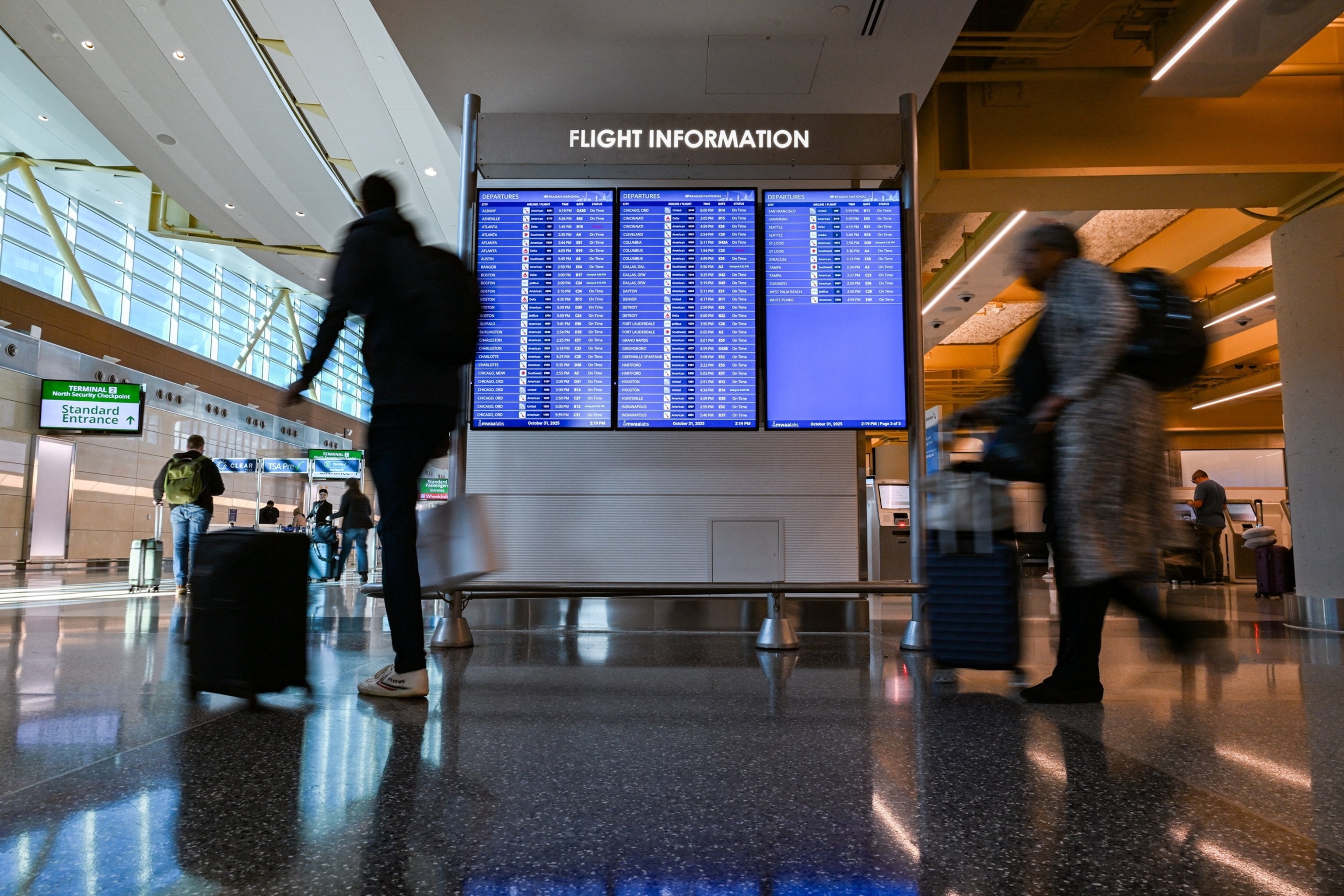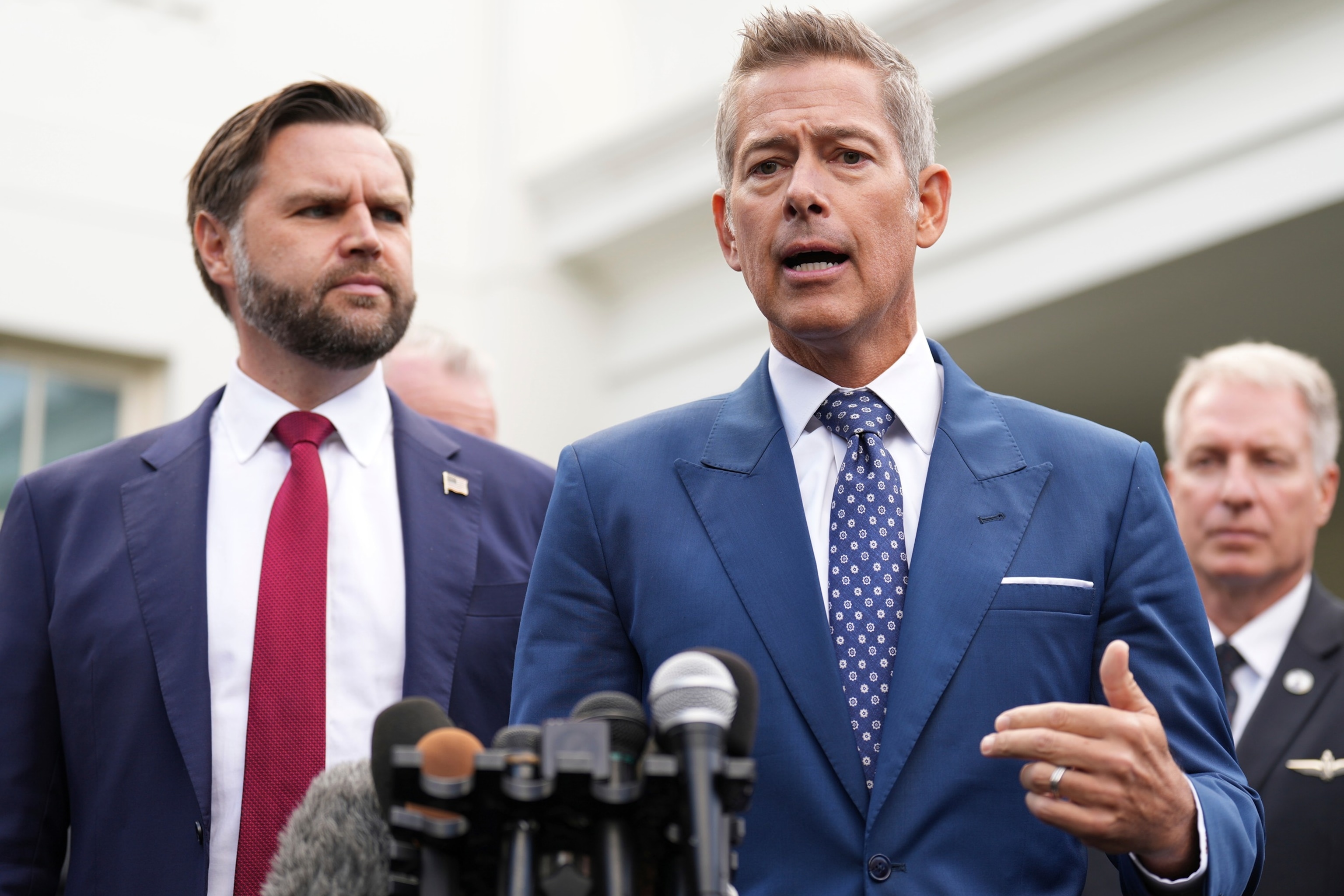A surge in callouts among air traffic controllers "is straining staffing levels" at multiple airports across the U.S. -- including in the New York City area where 80% of controllers are absent, the Federal Aviation Administration said Friday evening.
In an update, the FAA said half of the 30 busiest facilities in the U.S., known as the "Core 30" were experiencing staffing shortages, "leading to widespread impacts."
The disruptions came as the government shutdown stretched into its 31st day, showing little sign of resolution as opposing lawmakers exchanged barbs and dug into their positions.
Air traffic controllers, who are required to work without pay for the duration of the shutdown, are credited with helping end the most recent shutdown in 2019, when a series of absences delayed flights and heightened pressure on members of Congress.

Travelers walk through the airport as the U.S. government shutdown enters 31st day in Washington, DC, U.S., October 31, 2025.
Annabelle Gordon/Reuters
Earlier Friday, staffing shortages snarled flights at airports in Boston, Nashville, Dallas and Newark, New Jersey, among other major cities, according to FAA advisories.
"After 31 days without pay, air traffic controllers are under immense stress and fatigue," the FAA said in the update. "The shutdown must end so that these controllers receive the pay they’ve earned and travelers can avoid further disruptions and delays."
The FAA said it doesn't compromise safety and when staffing shortages occur, it is forced to reduce the flow of air traffic to maintain safety, which leads to delays and cancellations.
Speaking at the White House on Thursday, Vice President J.D. Vance voiced concern about the challenges faced by aviation workers.
"Everybody here is very worried that we're going to see more delays, more stresses on the people who are actually making the aviation system run and more problems for both the consumers, but also the great workers who actually make this incredible shining jewel of the American economy actually work and work on time and work safely," Vance said.
Here’s what to know about air traffic controllers amid the government shutdown and how staffing shortages could impact travel:
Why do air traffic controllers work without pay during the shutdown?
Since air traffic controllers are considered essential workers, they are required to work without pay for the duration of the government shutdown.
Air traffic controllers missed their first paycheck on Tuesday. Air traffic controllers, like other federal employees, typically receive backpay once the government reopens, but they must draw from savings or find alternative income in the meantime.

Transportation Secretary Sean Duffy speaks alongside Vice President JD Vance about the impact of the government shutdown on the aviation industry, outside of the West Wing of the White House, Oct. 30, 2025, in Washington.
Jacquelyn Martin/AP
The median annual salary among air traffic controllers is roughly $150,000 but starting pay clocks in well below that at about $50,000, Jake Rosenfeld, a professor of sociology at Washington University in St. Louis, who studies labor in the aviation industry, told ABC News.
"For those who just started out on the job, the pressure is really acute," Rosenfeld said.
The most recent shutdown -- which spanned from late 2018 to early 2019 -- lasted 35 days. Afterward, air traffic controllers received full back pay.
What is the scale of staffing shortages and travel disruptions?
Staffing shortages among air traffic controllers have worsened over the course of the government shutdown, though they remain limited to a fraction of facilities nationwide, analysts told ABC News.
On Friday, significant staffing shortages impacted a small share of the hundreds of air traffic control facilities across the country, Michael McCormick, a professor at Embry-Riddle Aeronautical University and a former air traffic controller, told ABC News.
Still, he added, a limited number of worker absences at key airports can cause far-reaching disruption for travelers, McCormick said
Boston’s Logan International Airport, which reported staffing shortages and delays on Friday, serves as an airline hub for Jet Blue. Dallas Fort Worth International Airport, a hub for American, also reported staffing-related delays.
"When you have delays at airline hubs, it interrupts the schedule and that means passengers can't make connections, baggage can't make connections, and crews and aircraft aren’t where they need to be," McCormick added.
Is it safe to fly?
On Thursday, Vance said Americans "shouldn’t be afraid to fly during the shutdown."
McCormick, of Embry-Riddle Aeronautical University, said the delays should serve as a counterintuitive source of reassurance for passengers, since disruptions result from a reduction of flight traffic to account for the shortage of workers.
"I firmly believe it’s safe to fly," McCormick added. "The whole reason there are delays is that they’re throttling down the demand in the system to match the staffing levels."
"The challenge for passengers who are flying in these times is that these are unpredictable delays," McCormick added.
Airlines often identify weather events ahead of time and alert passengers, but staffing-related disruptions typically emerge without warning, he said.
.png)




